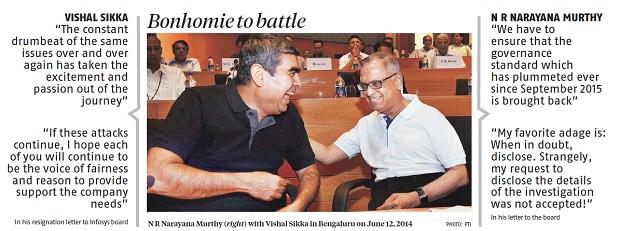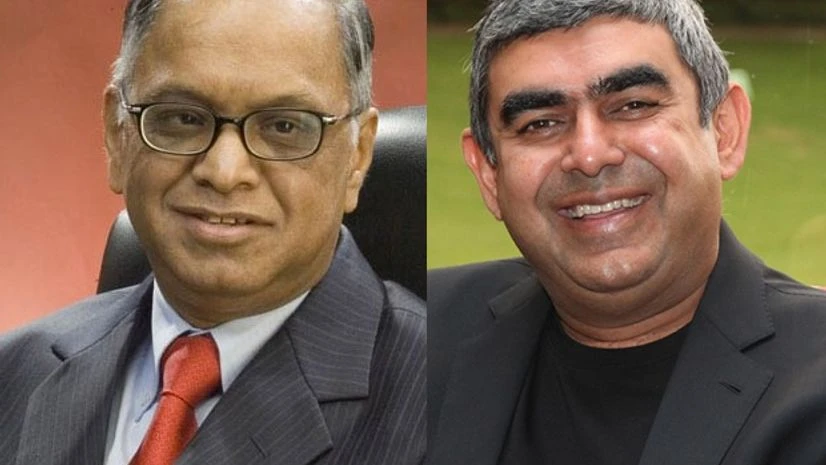Corporate India woke up to yet another departure of an embattled chief executive on Friday morning. In less than a year of Cyrus Mistry getting ousted as Tata Sons chairman, Infosys told the exchanges that its Managing Director and Chief Executive Officer Vishal Sikka had resigned after a battle between the board and the founders played out in the open for months.
His resignation — which prompted a 9.6 per cent fall in the company’s share price while wiping away Rs 22,500 crore in market capitalisation — followed protracted tensions with the founders that sparked concerns about a major distraction of management’s attention. The company blamed co-founder N R Narayana Murthy for Sikka’s resignation, saying that the co-founder had put the CEO under “continuous assault” and made “inappropriate demands” such as asking for the appointment of specific individuals to the board. In fact, employees said that 49-year-old Sikka’s stress was showing for a while and that he was joking and laughing less in office.
In a clear reference to Murthy, Sikka’s resignation notice to the board also complained of “malicious and increasingly personal attacks amplified by the very people from whom we all expected the most steadfast support”.
Murthy hit back saying he was “anguished” by the company’s allegations, but added that it was beneath his dignity to address them. He also took aim at the investigations into the anonymous accusations against Infosys’s management, questioning whether they could be considered “impartial and objective”.
More From This Section

Sikka, who recently completed three years at Infosys, wrote a long and emotional note to employees on Thursday, expressing his anguish at “baseless/malicious and increasingly personal attacks” against him. The latest was a leaked letter quoting Murthy that some independent directors believed that Sikka was CTO material and not CEO material.
“I cannot carry out my job as CEO and continue to create value, while also constantly defending against (such) attacks,” he said in the letter, which he also put up on his blog. He pointed out that when he came in, the “growth rates were low and attrition was high”. He gave out growing revenue numbers and a longer list of high-value clients to say things had only improved under his leadership.
Sikka blamed “distractions” as a reason for his resignation. Saying that he had no regrets, he quoted Apple founder Steve Jobs in another letter to the board members announcing his resignation. “Your time is limited, don’t waste it living someone else’s life. Don’t be trapped by dogma, which is living the result of other people’s thinking. Don’t let the noise of other opinions drown your own inner voice,” Sikka said.
The board also backed Sikka fully and said his “outstanding leadership” was a great boost for Infosys. In an open confrontation with Murthy, the company said, “a series of careful investigations found no merit to the unsubstantiated and anonymous allegations that had been asserted”.
Sikka has been appointed executive vice-chairman and would hold office till March 31, 2018, when the new permanent CEO and MD takes charge. U B Pravin Rao, chief operating officer of Infosys, has been appointed the interim MD and CEO of the country’s second-largest IT services firm. Sikka will receive an annual salary of $1 in his new role.
ALSO READ: Vishal Sikka caught in the clash of cultures
Co-chairman Ravi Venkatesan, who had earlier said Infosys board could consider giving a formal role to Murthy, on Friday said it would be a difficult option. “Unfortunately, the event of last 48 hours has made it quite difficult at this point in time to really consider that actively,” Venkatesan said.


Even as jury is out on why exactly Sikka had to leave, the disagreements between the founders and the board started in February last year when the board decided to give Sikka a 55 per cent pay hike to $11 million. Only 23.57 per cent of promoter votes were cast in favour of reappointing Sikka as managing director and CEO in April last year. The founders also were unhappy with the board’s decision to approve a “generous” severance payment to then CFO Rajiv Bansal.
But the real flashpoint came after Murthy raised corporate governance issues with Infosys’ acquisition of Israeli company Panaya, a leading provider of automation technology, at $200 million in February 2015. Following a whistle blower’s complaint to Sebi that procedures were not followed for the acquisition, Murthy made public statements hinting at corporate governance flaws at Infosys. Although forensic investigations were carried out, the reports have not been made public. Murthy insisted that reports should be made public and sought an answer to why Bansal had objected to the Panaya deal and subsequently quit.
While Sikka is likely to head back to the US, from where he had come to join Infy after his stint with SAP, there’s a growing buzz around the possibility of Nandan Nilekani returning to the software company as a non-executive chairman. But sources indicated that Pravin Rao may finally get to lead Infosys. Founders would be comfortable with a trusted insider, something that Rao has been for 30 plus years. If indeed Rao is named the CEO, it will be another similarity with the Tata group which chose N Chandrasekaran, then TCS boss, as the chairman of Tata Sons earlier this year.
Analysts said when Sikka became the first non-founder chief executive of Infosys in August 2014, he had multiple challenges both on business and cultural fronts, given the changing focus of global clients towards digital technology.
However, the innovation and digital transformation did not result in better returns for Infosys shareholders and the market capital has only eroded. Muted return, some analysts pointed out, has been a trend for almost all the Indian and some global IT services stocks given the economic slowdown in key markets such as the US and Europe.
“Sikka is from a different league. Without him as CEO, it kind of goes back into old format of Infosys. Reported talks of one of the founders coming back to the board may have created a sense of lack of freedom for Sikka,” said Rajesh Gupta, India Partner, IT research firm ISG.



)
